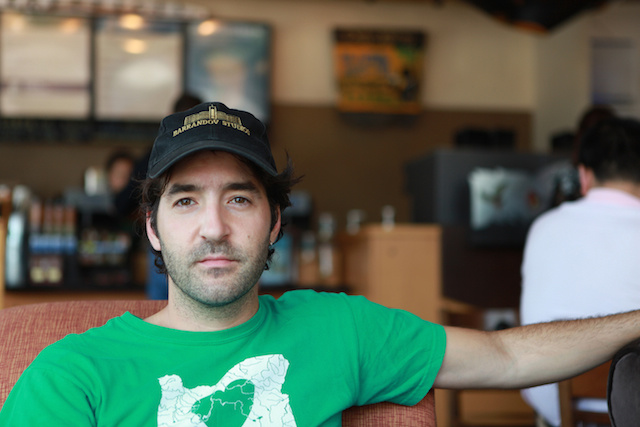This story originally appeared on Noisey UK.
A camera focuses on some abandoned high school corridors—there’s a locker with a sock hanging out, and the opening keys of a lo-fi piano-driven power ballad begin to twinkle. “I LOVE MY ROOM!” belts a tender teen voice, with an unabashed Beatles obsession trying desperately to hide beneath every enunciated note. “YEAH!” it goes on, “I hope you like it too-ooo-YEAH!” It builds and it builds and it builds, and then it stops.
Videos by VICE
The song is dumb as shit and charming as hell; it perfectly projects onto the wall of your mind that completely overblown territorial dependence our precocious teen selves all had for our bedrooms at one time or another. The unmade bed. The swollen wardrobe. The wash piles on the floor. The VHS of Hellraiser. Everything in its right place. Do not enter.
This comprises one of the earlier scenes in music documentary Heaven Adores You, and the kid singing is a 13-year-old Elliott Smith, the globally adored and prolific American singer-songwriter who died in 2003, aged 34, and whose discography still fascinates people around the world—his fragile vocals, vivid lyrics, and lush harmonies, still as potent now as they were when he was alive.
But this song, “My Room,” playing aloud in the film, doesn’t fit much into that portrait of the painfully talented suicidal troubadour we’ve come to expect from over a decade of posthumous media portrayal. We’re acquainted with Elliott Smith write-ups that always possess a tragic edge; how the fame, depression, drug abuse, loneliness, and alcoholism moulded the art we fell in love with. But this kid singing sounds more like a pubescent pianist with more fizzing ideas than worries.
In essence, that is the constantly beaming, overarching message of this new crowd-funded documentary from Nickolas Rossi, about the life of Elliott—that his story doesn’t always have to be a tragic one, that his music doesn’t always need to be regarded as dark, that before those final days of gloom came years upon years of light emanating from a witty kid with a music brain. Of course, Heaven Adores You covers Elliot’s death, but the volume of the film is spent on understanding what made Elliott special, rather than what made him take his life, told through the testimonials of his friends, family, and fellow musicians. I called up the director Nickolas Rossi, whose connection to Elliott stretches all the way back to his own Portland college days, to discuss the making of the film, the music involved, and the difficulties of handling a legacy with sensitivity.

Noisey: Hi Nickolas. Tell me, how did you first discover Elliot for yourself?
Nickolas Rossi: Discovering him was a matter of me living in the same city as he was making music at the time. I was living in Portland in the mid-90s, and he was playing in a band called Heatmiser. He was just another dude in another band that was playing in this small little gem of a city.
Your film is a pretty incredible account of Elliott. The way you’ve used audio of him is very clever, in that it almost feels like he’s narrating the whole thing himself. Which is eerie but also quite beautiful. He feels present, rather than just the object of an homage.
Well, it was kinda both right? It was a choice to disclose at the very beginning that this is a story of someone who passed away. Obviously, the fans know Elliott is no longer with us. For people who don’t know him, it was still easier to say at the very beginning: Here is a guy, who had a lot of fame, who passed away, and this is the story of his life. The impetus for that was a KCRW interview we found that threads throughout the entire film. It’s this interview where he’s being asked “So why did you move to Portland? I heard you’re moving to New York?” And it was this awesome chat where you kinda had Elliott telling the story of Elliott Smith, right there. We decided we should totally have Elliott narrate this, instead of a bunch of people talking about him. As much as we could find of him talking about his life, we used it. It was our choice to do it that way. After all, he was the best person to tell the story.
It’s quite obvious throughout the film that you wanted to make this an uplifting account of his life.
Of course! Listen, as time went on after Elliott’s death, he became known as this sad, sad guy who made sad and depressing music, and there is a certain element of truth to that but it is also so much more complicated. Dorien Garry sums it up at the end of this film when he says Elliott would be heartbroken if he knew that people just think of him as this sad guy, because that’s such a small part of who he was.

Portland, Oregon
Who was he then?
From talking to his friends, family and fellow musicians we found that there were way more stories about Elliott being incredibly funny, witty, well-educated, well-read, and a generous beyond belief person. It was important to focus on the positive things, than the predictable depressed guy who made depressing music. His music is not all doom and gloom; he’s an incredible storyteller, an observer of situations, and a lot of these things aren’t even about him. He sings in these universal themes that are very relatable, so that people really get what he’s talking about. Why always focus on the sad, dark stuff about Elliott, when there is this beautiful part of his life before all that?
Continued below.
Why do you think that has become the enduring association with Elliott?
I guess, for some people, if you didn’t know him in his Portland days, then you were probably exposed to him after he appeared on the Academy Awards in 1998 (when “Miss Misery” was nominated for Best Original Song). That’s where a lot of people get exposed to him for the first time, and things get pretty hard and dark after that. It’s a shame to think that’s the only part of Elliott that some people will ever know, the time where things got hard and dark. There was time when things were actually quite light, and that is a much more interesting story to me. This was about sending him off in a more positive light than the media has painted him since his death.
You do this in the film via some incredible interviews, but there are also some really special scraps of music and photography that most of us have never seen or heard. When uncovering all this, did you find anything that really made you gasp?
When we sat down with Larry Crane [a close friend of Elliott’s and fellow musician] and started listening to music Elliott recorded as a teenager, that was quite an “oh my god” moment. You think of Elliott Smith as this late 20s adult making music, but he was recording stuff at 13 years of age, and it was really quite good. It really shocked me to realize he was really talented and very proficient at a very early age, doing all this years before any of his knew how good he was.

A bit of a child prodigy then. And what about all the photos you uncovered?
Most of those pictures came from his friends and the interviewees. Everybody seemed to have some on-the-road pictures, or being in Portland photos. People were very generous with their photos of their time with Elliott. They were willing to share those limited but very precious moments in time with us.
Yeah, the photos of Elliott playing in Portland feel iconic. You were there back then right? What was it like being in that city?
At that point, Seattle had already had its big exposure through Nirvana, Soundgarden, and the whole grunge thing. Portland was this quieter, more insular version of that. It was this little scene that was happening, years and years before I even got there. It felt like a big small town when I got there. It was a perfect place to be 20 years old, for life and music.
Was the Elliott you used to watch play in Heatmiser back then pretty different to the solo artist we all know?
Heatmiser was a different energy. Back then, that band was part of this new post-punk, post-grunge sound. Elliott was screaming his vocals and playing guitar. It makes an impression on you. But a year or two later, when he started playing these solo shows of just him with an acoustic guitar, it was a very different sound and vibe. People would be silent listening to him. I guess people were, not confused, but definitely they didn’t expect him to be doing it, especially at that time, with all the other bands doing what they were doing.

Nickolas Rossi, director of Heaven Adores You
Would you say it was quite a jarring artistic move?
Some would say it was a typical punk rock move. All these bands were doing these three chord high energy riffs, and then there is this one man, Elliot Smith, singing with an acoustic guitar from his heart about universal themes of love and sadness.
That’s brilliant. A bit more generally speaking about the documentary… A lot of people have talked about Kurt Cobain: Montage of Heck and the forthcoming Amy Winehouse doc, about how quite often these films can be become invasive and voyeuristic, exposing things the artist never really wanted out there. Was this thought always in the back of your mind?
Yeah, especially when we were working with music that he made when he was younger. That song “I Love My Room”, there was a part of me that thought, would he be really embarrassed if he knew that this song he made when he was 13 years old would become widely circulated? Would he like that? Would all these photos of him as a preteen or a child be embarrassing for him? But I think there is a line where you want to portray somebody in an honest light, and you need to make sure you are always respectful of their life and the stuff they have always put out. So, there is a concern, but we were clear that the music would drive this film. The personal stuff was the personal stuff, but the music was what it was about.
You have a unique position as a fan of Elliott, to have seen him come of age in Portland, and then followed him from there. What would you say to the millions who have discovered him posthumously?
I hope there is something in this film that will make you really appreciate where the music came from. I don’t think there was this really dramatic, explosive experience of Elliott Smith that we’re always shown. He was just a kid, a kid who was passionate about making music, and who found the means to do it. That’s it.
Thanks Nickolas.
You can follow Joe on Twitter.
Heaven Adores You is released in cinemas worldwide from May 7, through Eagle Rock Entertainment/SpectiCast
More
From VICE
-

Kevin Mazur/Getty Images for The Recording Academy -

Screenshot: Netflix -

Screenshot: Netflix -

Illustration by Reesa.
